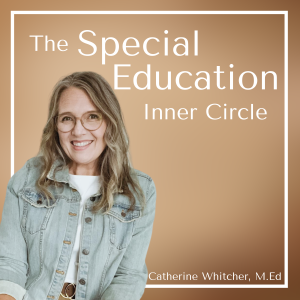
Special Education Inner Circle
Education

Inclusion Podcast Highlights
(00:19)
We're going to talk today about three different things that you can do to avoid the trap of having students earn inclusion. We really do not want to approach inclusion from the standpoint of earning inclusion. If inclusion has to be earned it really starts to give a feeling not just for the student, but for the entire student body, that inclusion is something that you earn to be with the good kids. And if you don't earn inclusion, you go to the special education room as if that's a bad thing.
(01:26)
Now that's not the intention of the IEP team of the teachers, or the staff, or the team, but it's what the feeling is and that's really what inclusion is... Inclusion is a feeling. Now we've all felt excluded from activities, right? You as a parent, as a teacher, as an adult, you have felt excluded from a party or a community event or maybe a workshop that you're attending. You know what that feels like?
Let's really work on creating inclusive experiences on your school campus for every child from the minute that they step off the bus to the time they go back home, they should feel included as part of the school body.
So the first thing, our first step that you need to do when you're struggling with this concept of inclusion is to really figure out what does inclusion mean specifically for this student's inclusive experiences.
(02:30)
Inclusion Does not mean taking a child who learns differently and plopping them into a general education environment. Inclusion means making sure that a child can participate in an activity at their level and that they are accepted for who they are. Inclusion does not mean that you're doing everything that everybody else is doing. Inclusion does not mean that you have to be put out of your comfort zone and struggle to keep up with everybody else.
Inclusion can mean participating a reading activity where everybody is in the same classroom and they're reading their own books and they're having their own snack and they have their own juice sitting on their desk and a child is participating collaboratively in a parallel activity.
(03:28)
What are the child's strengths? What are we looking to achieve? Where are we really looking to create? When we talk about this inclusive experience, that's your task number one.
Now remember, this does not need to be an academic activity, but it also should not default to the standard gym music art as the options for inclusion. A lot of times those are the most difficult classes to include a child for a variety of reasons.
The second step that you need to do is to start taking data and not just on the student. When you're looking to create more inclusive experiences, it's time to start taking data as a team for what you are doing as a team to support a child, not just in their accommodations and modifications in their current environment and not just on their accommodations and modifications and supports and inclusive environment, but also what are you doing to teach the skills that are needed for that inclusive experience that you've defined as a an achievement you've defined as a goal.
(05:56)
Now, third thing that I want you to do is set some really, really clear timelines, deadlines and communication plans. We cannot create effective inclusive experiences if we don't have timelines of who's doing what, deadlines for when we decide is this working or not, and full communication plans between the team. Parents, teachers, therapists, and also the general education teachers...They all need to be included in this communication plan.
(07:44)
This is not just about a child working towards being in a less restrictive environment. This is about the team supporting a child to live in a community longterm with peers of all ability levels. Inclusion is not about being like the other kids. Inclusion is about preparing a child for further education, employment, independent living, which is the entire purpose of an IEP.
That means inclusive experiences need to happen because we do not live in communities where they're not going to experience inclusion. In fact, students are going to be tossed into inclusion when the school years are over beyond what they've ever experienced in a school system. So we need to do our work now by taking these steps and preparing every child for inclusive experience on their school campus.
Remember, if you want to learn more on how to make all of this happen, you can join me at www.masteriepcoach.com
More Episodes
 2023-12-13
2023-12-13
 2023-11-22
2023-11-22
 2023-11-15
2023-11-15
 2023-11-09
2023-11-09
 2023-11-01
2023-11-01
 2023-10-25
2023-10-25
 2023-09-29
2023-09-29
 2023-08-30
2023-08-30
Create your
podcast in
minutes
- Full-featured podcast site
- Unlimited storage and bandwidth
- Comprehensive podcast stats
- Distribute to Apple Podcasts, Spotify, and more
- Make money with your podcast
It is Free
- Privacy Policy
- Cookie Policy
- Terms of Use
- Consent Preferences
- Copyright © 2015-2024 Podbean.com





